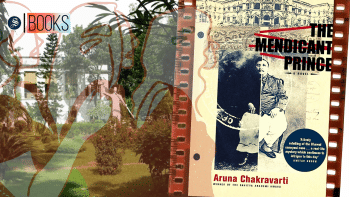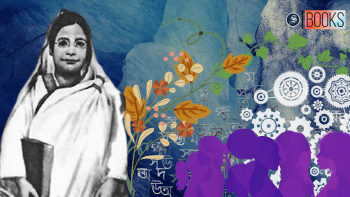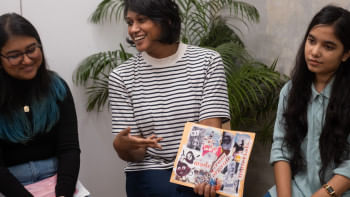Razia Khan Amin: A Bangladeshi writer in English

As an academic, I often share with students my writings that are related to the courses I teach. I also invite them to read my other works partly to revel in the pleasure of sharing and to inspire them to be involved in knowledge production and dissemination. That was not the case with our educators when I was a student in the Department of English at Dhaka University. The reason was not because there were no writers among our teachers.
Quite the contrary, there were some very capable writers–both creative and critical–among our teachers in the department. Like most writers, they also had the urge to share their works with others. For example, during my PhD years in the UK, I came to Bangladesh in 2002 on holiday and approached several academics to discuss, and to get their feedback on, my doctoral research. I visited Manzoor Sir (Professor Syed Manzoorul Islam) at his office at Dhaka University's Kala Bhaban (Arts Building). When I told him that I was researching the feminist writings of Rokeya Sakhawat Hossain for my PhD, he immediately picked a book from the shelf and ran to the Dean's office. He photocopied his essay, "Subaltern's World View: A Reading of Sultana's Dream" (included in Firdous Azim and Niaz Zaman ed. Infinite Variety: Women in Society and Literature [1994]) and handed it to me. It proved very useful for my research.
I first came to know Razia Khan Madam as a Bangladeshi writer in English during my PhD years. Later, Professor Mohammad A. Quayum of Australia's Flinders University and I undertook three major research projects–one book and two journal special issues–on Bangladeshi literature in English.
However, when I was studying at Dhaka University for my first degrees in the 1990s, none of my teachers shared with me their essays or books. Perhaps their modesty prevented them from indulging in the act of sharing their writings, which could be interpreted as self-promotion. Or they didn't want their pupils to be distracted from the primary course work. The flip side of this otherwise praiseworthy strategy of not sharing their published works was that I was almost totally ignorant of their writing careers. It may sound weird, but at that time I didn't know that some of my teachers were great writers.
The strangest case was that of my teacher, Professor Razia Khan Amin (1936-2011). I was in her tutorial groups during both my undergraduate and graduate studies. If I can claim any merit for myself as her student, I was one of her favourite pupils (I hope this will not be interpreted as my presumptuousness). Once my friend Kazi Helaluddin and I even visited her at her residence in Gulshan.
Despite all these, never did I know that Razia Khan Madam had produced her debut novel Bottolar Upannayash at the age of 18 (it was published in 1958) and had started writing critical and journalistic pieces long before I was born.
I first came to know Razia Khan Madam as a Bangladeshi writer in English during my PhD years. Later, Professor Mohammad A Quayum of Australia's Flinders University and I undertook three major research projects–one book and two journal special issues–on Bangladeshi literature in English. As I began diving deep in this literary tradition, I became more conversant with Razia Khan Madam's iconic status as a Bangladeshi writer in English.
In our Introduction to Bangladeshi Literature in English: A Critical Anthology (2021), Professor Mohammad A Quayum and I write: "Bangladeshi English-language writers in the post-1971 era can be divided into two generational categories. The older generation includes, among others, Razia Khan Amin (1936-2011), Niaz Zaman (1941-), Feroz Ahmed-ud-din (1950-) and Kaiser Haq (1950-)". The book includes my co-editor's interview essay titled "A Highbrow 'Hijra': Kaiser Haq in Conversation with MA Quayum" where the interviewee states: "The history of English language poetry in Bangladesh can be easily sketched. Our teacher Razia Khan Amin (1936-2011) is the first we should mention". We didn't receive a publishable manuscript on the work of Razia Khan Madam to include in the anthology. As its editors, Professor Mohammad A Quayum and I are "disappointed" that the book does not contain a chapter on her.
In our Introduction to a special focus issue of Journal of Postcolonial Writing (Routledge) on Bangladeshi literature in English, Professor Mohammad A Quayum and I note:
Razia Khan, a decorated writer in Bangla, commenced writing in English in the early 1950s. However, her two volumes of poetry, Argus under Anaesthesia and Cruel April, came out in 1976 and 1977 respectively. She also wrote two novels, The Enchanted Delta and The Tamarind Tree, both published posthumously in 2020. Her works generally focus on gender, nationalism, and multiculturalism, expressing a deep sense of pride in Bangladeshi history, culture, and identity and a call for the empowerment of women.
Commenting on the merit of Razia Khan Madam's work, her colleague and my teacher Professor Serajul Islam Choudhury says: "Razia Khan was among the brightest of our time. Her talents were manifold and fields of activity both wide and colourful." He evaluates her literary career thus: "She has responded to the world around her, grasped the meaning of her personal experiences and put them artistically in their proper context with a restraint which is charming."
I have collected all of Razia Khan Madam's English writings posthumously printed in two magnificent volumes–Razia Khan: Collected Poems (2014) and Razia Khan: Omnibus Edition (2020). These two titles have helped me conceive an idea of using them for major research. In that sense, the current essay can be seen as a precursor to my future endeavour–extensive research on her work.
Although Razia Khan Madam was a professor of English and, in this essay, I have presented her mainly as an illustrious Bangladeshi English-language writer, based on my reading of her critical essays, I can safely say that her knowledge of Bangla literature and our cultural heritage was broad and profound. And this suggests that she was a voracious reader of both Bangla and English literature. When reading her critical pieces, I was amazed by her valuable insights on a disparate variety of Bengali writers and their works.
For instance, in an essay published in 1970, she says: "Nazrul Islam (1899-), Kaikobad (1898-1951), the world-famed Jasimuddin (1903-), Ghulam Mustafa (1897-1964), Abdul Quadir (1906-), Begum Sufia Kamal (1911-) and Mahmuda Khatun Siddiqua (1910-) have created a [poetic] genre which is mainly idealised romantic and ornamental." In another essay titled "The Feet of Pegasus"–published around that time – she observes: "[W]hen Farrukh Ahmed like Nazrul Islam uses subject-matter, diction and mood which give his poetry Middle-Eastern characteristics, he uses them with a vitality and judiciousness which make these imports generally acceptable." Considering her critical essays on both Bengali and Western writers and their works, her contributions as a literary scholar are no less remarkable than her career as a creative writer.
Razia Khan Madam is part of a literary heritage that is rich and varied. We need committed, competent and confident researchers, especially from within Bangladesh, to analyse, evaluate and explore the full extent of its breadth and depth. It is my hope that we–current and future researchers–will be able to do justice to the legacies of Razia Khan Madam and her likes who are still largely understudied and under-represented in literary scholarship.
Dr Md Mahmudul Hasan teaches English and postcolonial literature at International Islamic University Malaysia. Email: [email protected]

 For all latest news, follow The Daily Star's Google News channel.
For all latest news, follow The Daily Star's Google News channel. 













Comments